
Image source: Getty Images.
While it doesn't influence our opinions of products, we do receive compensation from partners whose offers appear here. We're on your side, always. See our full advertiser disclosure here.
When you take a deep dive into your budget, chances are, you'll see that a number of your recurring monthly expenses are actually debts that you need to repay. Your mortgage, for example, falls into this category, as do your car payment and credit card balances.
But Americans actually spend a surprisingly small chunk of their total income on debt, according to new research by The Ascent. In 2020's second quarter, debt ate up 8.69% of the typical consumer's income. That's a substantial drop from the second quarter of 2019, when the average American spent 9.69% of their income on debt.
Are Americans getting smarter about debt?
It could be that more consumers are realizing that heavy debt loads can be unhealthy, and are taking steps to pay down what they owe -- hence they're spending less of their income on it this year. But debt relief programs could also be contributing to this trend, as could coronavirus relief programs.
Under the CARES Act, for example, which was signed into law in late March to address the financial fallout of the pandemic, any struggling homeowner can request to put a mortgage into forbearance. Borrowers who are pausing home loan payments with permission this year under that provision may, as a result, be spending a smaller percentage of their household income on debt payments.
Why keeping your debt level low is important
If you're currently spending a much higher percentage of your income on debt than the typical American is, it may be time to rework your budget, cut back on costs, and figure out ways to lower your total debt load. For one thing, the less debt you have, the more financial flexibility you'll have to handle unplanned expenses as they arise. Also, less debt means less money wasted on interest. And keeping your debt level low will help you keep your debt-to-income ratio in favorable territory. That's important if you're planning to apply for a home loan in the near term because lenders look at that ratio to determine if you're a good mortgage candidate.
Of course, not all debt is created equal, so if you're going to attempt to pay some down, focus on unhealthy debt like your credit card balances first. Personal loan debt is a little more favorable because you'll usually pay a lower interest rate on a personal loan than on a credit card, but it's still not considered as healthy as mortgage debt. When you take out a home loan, you do sign up to pay interest to a lender, but in exchange, you get to build equity in an asset that has the potential to increase in value over time.
Knocking out debt
You have several options when it comes to lowering your existing debt. First, you can cut back on other expenses to free up cash to pay it off. Second, you can look at getting a side job to generate more income. Third, you can try consolidating some of your debt, whether via a balance transfer credit card, a personal loan, or even a cash-out refinance on your mortgage, if you're a homeowner. While the average American spends 8.69% of his or her income on debt, it never hurts to lower that percentage as much as possible -- and free up more money for other important things.






